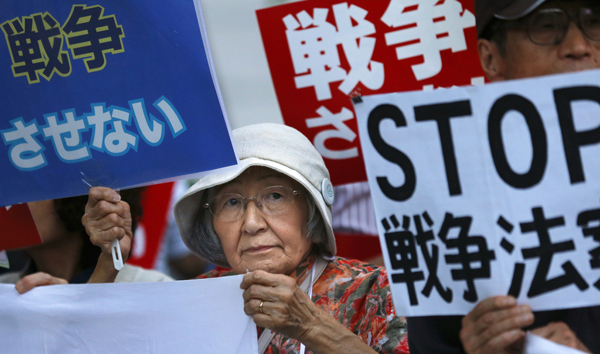 |
|
Protesters hold anti-war placards during a rally in front of the parliament building in Tokyo, June 11, 2015. [Photo/Agencies] |
"What Abe then tends to do is try and backtrack, by making ambiguous statements about the 'security environment' in the region, in order to generate fear among the public so they don't question his antics. Simultaneously he retroactively, and, as has been the case recently, unconstitutionally, tries to force legislation through parliament knowing his party has the majority vote in both chambers," Sinclair explained, adding that such tactics, however, were starting to" backfire horrendously."
Sinclair pointed to a recent poll taken by the popular Yomiuri newspaper this month which showed almost 60 percent of Japanese citizens "firmly oppose" the passage of the latest package of security bills, rising 11 percent from the same survey conducted a month earlier.
Further proving the Japanese public's growing disdain for the prime minister's autocratic and truculent moves to boost the legal scope of Japan's forces at home and abroad, was a recent survey by Kyodo News, which showed that over 80 percent of Japanese people feel that the government's explanations about the security bills are "not sufficient," compared to just 14.2 percent who feel they are.
Meanwhile, 68 percent of those surveyed said the security legislation would increase the risk of Japan's forces getting dragged into war, causing the approval rating for the Cabinet of Abe to fall 2.8 percentage points from April to below the key 50 percent threshold to 49.9 percent. The disapproval rating rose 3.1 percentage points to 38 percent, the survey also showed.
"The figures speak for themselves," said Sinclair."And the likelihood is that Abe's support rate and the disapproval of the security bills has increased since the prime minister has been forced to delay the passing of the bills due to the public outrage that has been seen in high-profile demonstrations around the country, most notably at the Diet building where opposition party members joined regular civilians to call for the bills to be quashed."